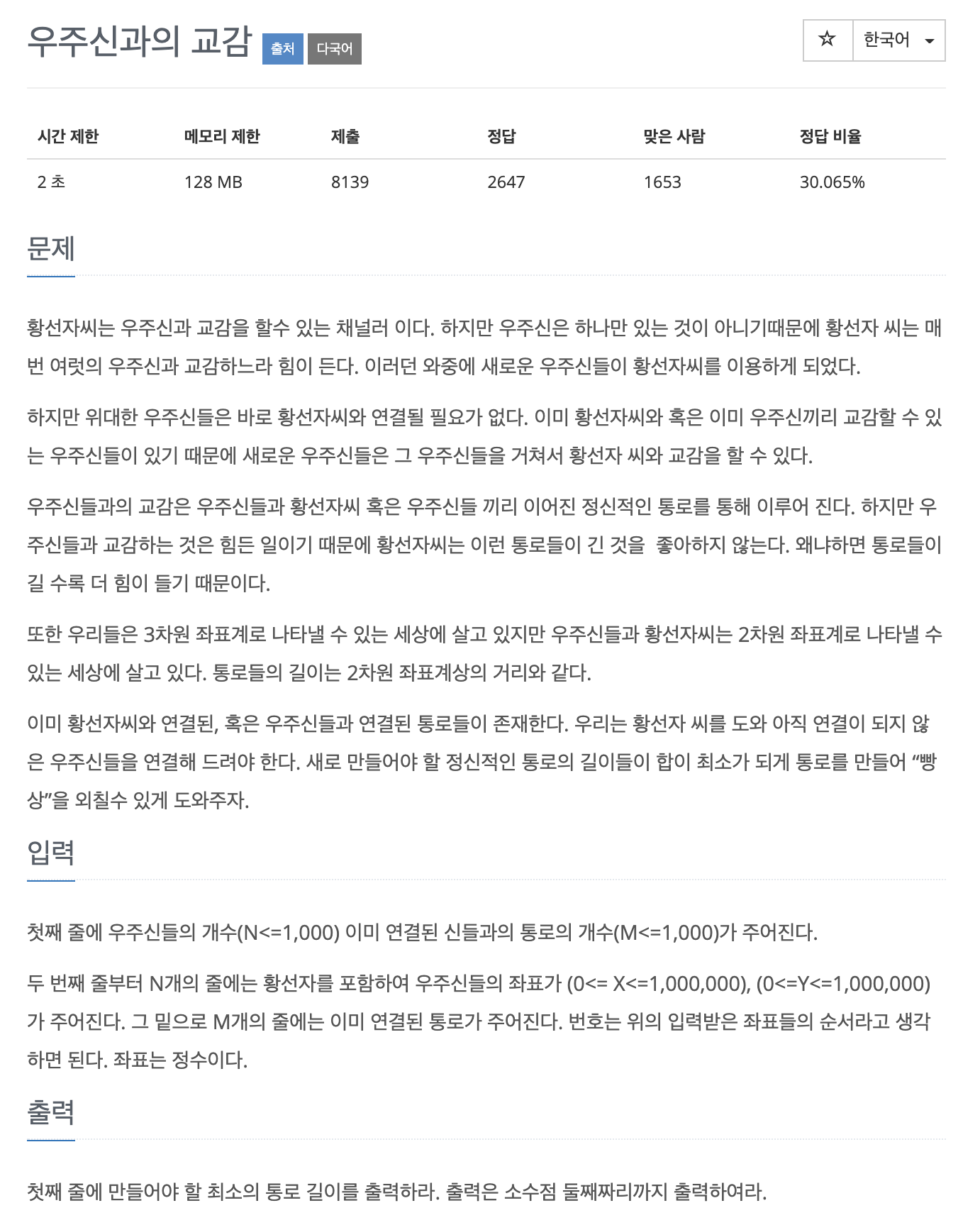Baekjoon Online Judge
algorithm practice
- 단계별 문제풀기
30. 최소 신장 트리
최소 비용으로 그래프의 모든 정점을 연결해 봅시다.
Java / Python
4. 우주신과의 교감
이미 사용된 간선이 있을 때 최소 비용으로 나머지를 완성하는 문제

이번 문제는 우주신들과 연결된 통로들이 존재할 때 ,아직 연결이 되지 않은 우주신들을 연결해, 새로 만들어야 할 정신적인 통로의 길이들이 합이 최소가 되게 통로를 만드는 문제이다.
최소 신장 트리 유형 문제이다. 크루스칼 알고리즘을 사용하여 풀 수 있다. 간선들의 리스트를 만들기 위해 우주신들 간의 거리를 계산한다. 그 후,오름차순으로 간선들을 정렬해준다. 간선과 연결된 두 노드의 부모를 비교하여 다를 경우에만 두 노드를 연결한다.
parent를 자기 자신으로 초기화하고, 부모를 찾는 함수 find와 합집합 연산을 해, 같은 부모를 가지도록 하는 union함수를 이용한다.
- Java
Point class : 번호, x 좌표, y 좌표 저장
Edge class : 간선의 정보를 저장, 연결된 노드(우주신) s, e와 비용 저장
import java.io.*;
import java.util.*;
public class Main {
static class Point {
int number;
double x, y;
Point(int number, double x, double y) {
this.number = number;
this.x = x;
this.y = y;
}
}
static class Edge implements Comparable<Edge> {
int s, e;
double cost;
Edge(int s, int e, double cost) {
this.s = s;
this.e = e;
this.cost = cost;
}
@Override
public int compareTo(Edge o) {
// Comparable을 통해 정렬 우선순위 (cost 기준)
return o.cost >= this.cost ? -1 : 1;
}
}
static int[] parent;
static ArrayList<Edge> edgeList;
public static void main(String[] args) throws Exception {
BufferedReader br = new BufferedReader(new InputStreamReader(System.in));
BufferedWriter bw = new BufferedWriter(new OutputStreamWriter(System.out));
StringTokenizer st = new StringTokenizer(br.readLine());
int N = Integer.parseInt(st.nextToken());
int M = Integer.parseInt(st.nextToken());
parent = new int[N + 1];
for (int i = 0; i <= N; i++) {
parent[i] = i;
}
Point[] points = new Point[N + 1];
for (int i = 1; i <= N; i++) {
st = new StringTokenizer(br.readLine());
double x = Double.parseDouble(st.nextToken());
double y = Double.parseDouble(st.nextToken());
points[i] = new Point(i, x, y);
}
for (int i = 0; i < M; i++) {
st = new StringTokenizer(br.readLine());
int start = Integer.parseInt(st.nextToken());
int end = Integer.parseInt(st.nextToken());
union(start, end);
}
edgeList = new ArrayList<>();
for (int i = 1; i <= N; i++) {
for (int j = i + 1; j <= N; j++) {
double cost = distance(points[i], points[j]);
edgeList.add(new Edge(points[i].number, points[j].number, cost));
}
}
Collections.sort(edgeList);
double result = 0;
for (int i = 0; i < edgeList.size(); i++) {
Edge edge = edgeList.get(i);
if (find(edge.s) != find(edge.e)) {
result += edge.cost;
union(edge.s, edge.e);
}
}
bw.write(String.format("%.2f", result) + "\n");
bw.flush();
bw.close();
br.close();
}
public static double distance(Point p1, Point p2) {
return Math.sqrt(Math.pow(p1.x - p2.x, 2) + Math.pow(p1.y - p2.y, 2));
}
// x의 부모 찾기
public static int find(int x) {
if (x == parent[x])
return x;
return parent[x] = find(parent[x]);
}
// y 부모를 x 부모로 치환하기 (x > y 일 경우 반대)
public static void union(int x, int y) {
x = find(x);
y = find(y);
if (x != y) {
if (x < y) {
parent[y] = x;
} else {
parent[x] = y;
}
}
}
}- Python
import sys
import math
sys.setrecursionlimit(10**6)
input = sys.stdin.readline
# 크루스칼 알고리즘
def find(x):
if x == parent[x]:
return x
parent[x] = find(parent[x]) # 부모 테이블 갱신
return parent[x]
def union(x, y):
x = find(x)
y = find(y)
if x == y: # 동일한 집합일 경우
return
if x < y:
parent[y] = x
else:
parent[x] = y
def dist(a, b):
return ((a[0] - b[0])**2 + (a[1] - b[1])**2)**(1/2)
N,M = map(int,input().split())
point = []
parent = [i for i in range(N+1)]
edges = []
result = 0
for _ in range(N):
x, y = map(int, input().split())
point.append((x, y))
for _ in range(M):
x, y = map(int, input().split())
union(x-1, y-1)
# 모든 point 간에 간선, 비용 계산 저장
for i in range(N - 1):
for j in range(i+1, N):
edges.append((dist(point[i], point[j]), i, j))
edges.sort(key = lambda x : x[0])
for e in edges:
cost, x, y = e
if find(x) != find(y):
union(x, y)
result += cost
print('%.2f' %(result))